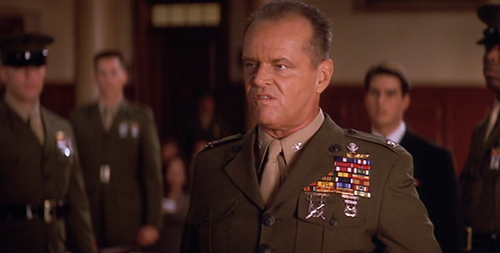Arguing the Classics – A Few Good Men

The age old debate between a cynical critic and an idealistic movie newbie — or was it the other way around?
I’ve seen a lot of movies over the years, and I have my favorites. But not everyone agrees with me. Meet Jon:

Jon’s a friend who hasn’t seen nearly as many movies as I have, and not as many of “the classics” (anything before 2002). Recently we’ve seen some movies he’s never seen before, which gives us a great chance to argue about them. A Few Good Men is one of the first DVDs I ever purchased, along with Airplane! and A Clockwork Orange. If you’re thinking I had an alphabetical list of movies that I was looking at, you are correct; but it was still a list of movies I would watch again and again. Something about the dramatic buildup is surprisingly easy to watch, even with the over two-hour running time.
And, of course, everyone’s familiar with the movie’s big moment of “You can’t handle the truth” — but maybe that’s a problem in rewatching it. There’s no tension to that moment, because you know it’s coming.
![]() : If I hadn’t known that scene was coming, I probably would have appreciated the sentiment more. As it is, the movie seems overly dramatized and unrealistic — sort of a precursor to the more realistic Law & Order courtrooms. And Tom Cruise wasn’t subtle enough to pull off his legal performance.
: If I hadn’t known that scene was coming, I probably would have appreciated the sentiment more. As it is, the movie seems overly dramatized and unrealistic — sort of a precursor to the more realistic Law & Order courtrooms. And Tom Cruise wasn’t subtle enough to pull off his legal performance.
There’s something off about Demi Moore’s Lt. Cdr. Galloway in the movie, although I didn’t see it at first. She’s almost a romantic foil; almost a plot foil; almost a figure of feminist strength. Still, I liked her performance, although I’ve heard it derided at times. Personally I also felt Cruise was very strong in this movie, but that’s admittedly a subjective sort of thing.
![]() : To me, her character was that stereotype of being overly emotional and caring while the men were being professional.
: To me, her character was that stereotype of being overly emotional and caring while the men were being professional.
I didn’t really see it that way, although there is certainly an element of the late-’80s/early-’90s attempts at post-sexism that didn’t succeed here or in other movies of the era. To me, it seemed like everyone was getting too emotionally invested, but she just represented one side of it. The more sexist moments to me were the explicitly sexist remarks from Jessup (Jack Nicholson) and the analysis of the jury that implied childless women were cold and unfeeling. Classic Aaron Sorkin (he wrote the screenplay)!
![]() : But my main problem is that you’re led by the movie’s POV to think that Jessup’s argument of “the ends justify the means” isn’t logical or rational in any way, even though — in my opinion — the needs of national security may sometimes trump our ideal methods. The point of view that the viewer’s supposed to empathize with (Tom Cruise’s) lacks nuance; from his POV, they are either guilty and bear ownership of the crime, or Jessup is guilty and it’s his responsibility. I feel that the more complex point of view, which ascribes some ownership to the immediate perpetrators of the crime and to those responsible for their actions with a nuanced understanding of the complexities of the military, was given short shrift. I also didn’t like the payoff when the Marines come to realize that they should’ve been protecting Santiago; I didn’t feel like it was earned nor did it satisfy me. And overall, it ages poorly in terms of that Cold War mentality, which was getting old even then [when the movie came out in 1992].
: But my main problem is that you’re led by the movie’s POV to think that Jessup’s argument of “the ends justify the means” isn’t logical or rational in any way, even though — in my opinion — the needs of national security may sometimes trump our ideal methods. The point of view that the viewer’s supposed to empathize with (Tom Cruise’s) lacks nuance; from his POV, they are either guilty and bear ownership of the crime, or Jessup is guilty and it’s his responsibility. I feel that the more complex point of view, which ascribes some ownership to the immediate perpetrators of the crime and to those responsible for their actions with a nuanced understanding of the complexities of the military, was given short shrift. I also didn’t like the payoff when the Marines come to realize that they should’ve been protecting Santiago; I didn’t feel like it was earned nor did it satisfy me. And overall, it ages poorly in terms of that Cold War mentality, which was getting old even then [when the movie came out in 1992].
The movie was based on an actual incident and a real life bunch of Marines in Guantanamo, although there was no accidental murder in real life. In fact, several of the Marines sued the production company for maligning their characters, among other charges — and one of them was even mysteriously murdered.
I don’t quite agree with Jon’s negative assessment of the movie’s arguments — to me, it seemed to be implying that corruption and radicalism is a problem, and that despite the honorable intentions of some, it can be easy to get overwhelmed by peer pressure. Of course, the impetus of everything, the murder, was invented for the film. Without that, it’s a different story altogether.
 CliqueClack
CliqueClack
